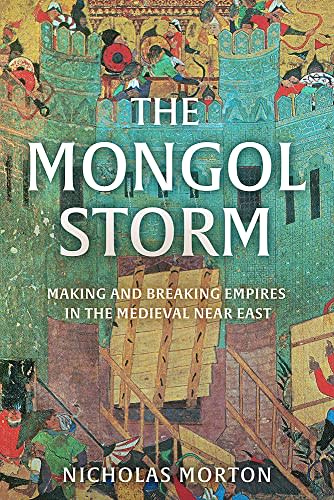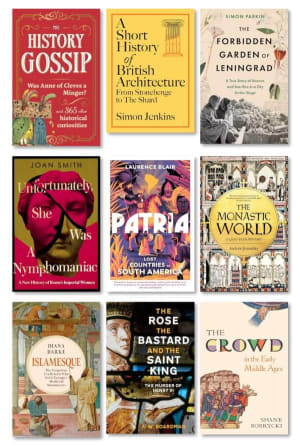Hands up if you've heard of the Ilkhanate Empire? If you've got your hand up: well done (assuming you are not bluffing).
For everyone else, and me included before reading Mongol Storm: Making and Breaking Empires in the Medieval Near East by Nicholas Morton, the Ilkhanate was one of the most influential empires in the medieval world. It either destroyed or was the genesis of many of the 'big names' in the western historical consciousness, including:
- ✝ Crusader states: destroyed (indirectly)
- ☪ Ayyubid empire (heirs of Saladdin): destroyed (directly)
- ⛓ Mamluk empire: created (indirectly)
- 🍽 Khwarazmian empire: destroyed (directly)
- 🕌 Ottoman empire: created (indirectly)
- 🐀 Black Death (indirectly)
So who were these guys?
As the title of the book indicates they were a branch of the Mongol empire - the horde that was sent west and south to hoover up the lands and kingdoms of the Middle East.
In the stratosphere
The Mongol empire was massive. It is the largest land empire ever1. Started by Genghis Khan at the beginning of the 12th century, by the end of the century it ruled over all of China, all of the Eurasian steppe, most of the Middle East, and a big chunk of Eastern Europe.
The Mongolian territories eventually came to be divided into four parts: (1) the Mongolian heartlands and China, (2) a central Asian bit just above India, (3) a Russian / East European bit and (4) a Middle Eastern bit. The Ilkanate was the Middle Eastern bit, covering what is now Iran, Iraq, Syria and the East of Turkey and was ruled by one of Genghis Khan's grandsons.
Weathering the storm analogies
Weather analogies probably get a bit overused in historical narratives but if anyone deserves to be compared to a storm it is the Mongols. In just a few years from 1218 and seemingly effortlessly, they had conquered pretty much everything in the Middle East (just like a storm).
Their 'storm cloud of war' also literally2 blew people around the map and totally reconfigured the politics of the region, even for those who were not directly conquered by the Mongols.
It's raining Mamluks
I found the emergence of the Mamluk state in Egypt a really interesting example of this.
Before the Mongols arrived on the scene Egypt was ruled by the Ayyubids - the heirs of Saladin. Nervous of the Mongol threat, the Ayyubids began buying up large numbers of slaves to bolster their army. The slaves were themselves a product of Mongol conquest, typically captured Turkic people on the losing side of a Mongol attack, who were sold in huge numbers out of ports in the black sea.
There were so many of them for sale that the Ayyubids could buy them up in bulk for cheap.
Winds of change
The trouble was that these conflict hardened slave soldiers were a little too good and a little too numerous, and came to realise that collectively they were more powerful than the state that they had been purchased to protect.
When the opportunity came they rose up, assassinated the Ayyubid ruler on the banks of the Nile and elected a military commander from amongst themselves, thus starting their own three hundred year polity - the Mamluk empire.
Blow back
Another fascinating aftershock of the Mongol storm was that, partly in order to demonstrate their legitimacy and right to rule, the parvenu Mamluks actively sought out confrontation with the Mongols, and managed to destroy a Mongol army in what is now northern Israel, significantly weakening the Mongols in the local area.
No shelter from the storm
And it was this Mamluk empire, together with other invading / migrating nomadic Turkic people pushed outward by the Mongols that finished off the crusader states.
Ensconced within their hugely impressive castles with massively thick and toweringly high walls, the crusaders could do nothing to stop the nomadic herds eating all their food and fodder in the fields outside. The castles were then picked off one by one by the Mamluks.
The enstormed people
The book covers a lot, and although the Mongols (or the threat of them) is the theme running throughout, most of the time other groups take centre stage. It is more about how these groups react to the Mongols than the Mongols themselves.
Style guide
The style of the book is very much 'one darned thing after another' - an awful lot happened over the 100 years of the thirteenth century in the middle east. Morton does a great job of cutting through the confusion though and I never felt overwhelmed with too many names coming at once.
If you want to 'find out what happened' this is an excellent book.
A slow start, finishing strongly
It did require a bit of perseverance though. I read this in two goes after initially giving up on it for a while. I was put off to start with when reading the initial bit on the fifth crusade and the attempted conquest of Egypt. I felt like it was more for military buffs interested in the tactical shenanigans of this or that campaign.
But when coming back to it a month or so later I found the narrative broadened out, turned to new subjects and just generally became much more interesting for me.
By the time I had finished I was a convert and would happily recommend this to other people who want to find out more about this time and place.
Nomads vs Farmers
One other thing I really appreciated about this book was the reminder that for much of human history nomadic civilisations have held the upper hand vs agriculturalists like us. It is easy to forget this living in England but the story of civilisation is just as much a story of herds as it is of cities.
Conclusion
If you agree with me that everyone should know more about the Ilkhanate Empire then you will enjoy this book.
Putting you in the variously sized shoes of the people of the middle east in the thirteenth century, it challenges you to think: what would you do if you were in the path of the Mongol storm?
Book details
(back to top)- Title -
The Mongol Storm : Making and Breaking Empires in the Medieval Near East
- Author -
Nicholas Morton
- Publication date -
October 2022
- Publisher -
Basic Books
- Pages -
432
- ISBN 13 -
9781399803557
- Podcast episode -
- Amazon UK -
- Amazon US -



